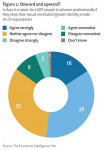European companies are not ready for “technology democracy”, says the Economist Intelligence Unit
This pressure will mount on corporate and IT management as a younger cohort of employees—reliant on social networking, messaging and other personal networking technologies to conduct their work—permeates organisations. “Companies will inevitably lose some control over IT use as a result, but this will be no bad thing provided the risks are managed,” believes Denis McCauley, Director of Global Technology Research with the Economist Intelligence Unit. “The best business innovations tend to originate at the grassroots level, and employees should be encouraged to use their technology know-how to generate them.”
These findings are highlighted in a new study published today by the Economist Intelligence Unit and sponsored by Trend Micro, entitled Power to the people? Managing technology democracy in the workplace. Other conclusions of the study are highlighted below.
· Innovation and morale stand most to benefit from technology freedom. Forty-two percent of European executives (and fully half of those from the UK) say they are prepared to deal with the risks of technology democracy in order to reap the business benefits. The chief gains, they believe, will come in the form of better grassroots innovation, as well as higher morale on the part of employees who are trusted to make at least some technology decisions for themselves.
· The risks are real but can be managed. The fears of executives who resist according greater technology freedom are not misplaced. Many employees have wasted valuable work time using Web 2.0 applications for personal purposes, and companies have been damaged by sensitive information appearing on blogs, for example. Respondents agree that the biggest risks from technology democracy are lower productivity, the loss of confidential information and an increased vulnerability to viruses.
· Keeping technology chaos in check requires clear rules. Where any degree of democracy exists, technology freedom must be supported by clear rules and regulations to prevent a descent into chaos. The most important means of minimising productivity loss and security risks include conducting regular and mandatory training courses for employees, developing formal guidelines and continuing the work of upgrading network defences.
· Firms must provide better training on using new technologies. Most executives in the survey claim that their firms have drafted IT policies to govern employees’ use of devices, applications and websites in the workplace. But few have begun to instil these guidelines in the minds of employees: no more than 21% of surveyed firms provide training on the use of personal communications devices, and only 17% do this in regard to social networking applications. More worryingly, no more than one-fifth have plans to do so in the future.
· Some IT decentralisation may be needed to manage the security risks. When asked their view on the implications of greater technology freedom for the IT function, survey respondents’ reply that the delegation of responsibility for information security to individual business units is the most likely outcome. This would allow the IT function to focus on other tasks, such as the management of firewalls and other aspects of physical network security and tracking new external threats.
웹사이트: http://www.eiu.com
연락처
Joanne McKenna
+44 (0)20 7576 8188
이메일 보내기
이 보도자료는 Economist Intelligence Unit가(이) 작성해 뉴스와이어 서비스를 통해 배포한 뉴스입니다.




